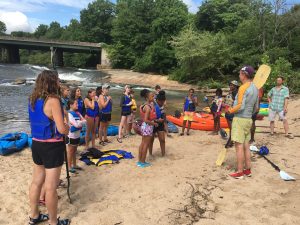
The Georgia-based South River Watershed Alliance was formed in 2000 to restore water quality and biodiversity for the community and wildlife. Cleaner water requires increased awareness, collective advocacy, stronger protection, and management of the river as a valuable natural resource. The South River, listed as #4 on the America’s Most Endangered Rivers® list, has been polluted since 1961 and the greatest threat to water quality is raw sewage from unregulated sanitary sewage spills. In 1991, all 60 miles of the South River were declared extremely polluted and in 2010, the EPA, Georgia EPD and DeKalb County entered into a consent decree to bring the county into compliance with the Clean Water Act and eliminate sewage spills. Through SRWA’s work, the consent decree has been extended and expanded, with most work completed in 2025. A lawsuit to compel DeKalb County to stop allowing raw sewage to spill into the South River is now pending before the U.S. Court of Appeals in Atlanta.
Helmed by Dr. Jackie Echols, the minority and women-led SRWA focuses on protecting and restoring the South River which flows through predominantly Black and brown communities in Fulton, DeKalb, Rockdale, and Henry counties. The river is a treasure, yet one steeped in environmental injustices. SRWA addresses these in numerous ways: monthly water quality testing and scouting for contamination sources; recreational programs, such as kayaking and canoeing outings; improved river access, including ADA accessibility; and active involvement in legal battles, including a lawsuit to stop the controversial “Cop City,” a $90 million police training center that threatens a 300-acre forest and the South River. In addition to the Clean Water Act lawsuit, SRWA has filed a Title VI Civil Rights Act complaint with the EPA, citing environmental racism. Despite the challenges, SRWA continues to raise awareness and engage the community to ensure the river remains a vital resource for all.

A diverse group of river enthusiasts joined in South River Paddle’s 2019 excursion.